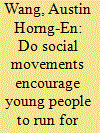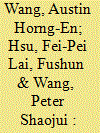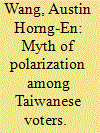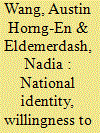|
|
|
Sort Order |
|
|
|
Items / Page
|
|
|
|
|
|
|
| Srl | Item |
| 1 |
ID:
173782


|
|
|
|
|
| Summary/Abstract |
The 2014 Sunflower Movement led to rising political participation among young Taiwanese. Hence, opposition parties and civic groups created programs to support young candidates running in the village chief elections. Compared with the 2010 election, however, fewer young challengers ran in 2014, and they received fewer votes and won fewer seats. Propensity score matching shows that the presence of young candidates on ballots did not increase turnout. However, young candidates affected the election indirectly: young, new candidates attracted more votes from incumbents than from challengers and therefore decreased the incumbent re-election rate.
|
|
|
|
|
|
|
|
|
|
|
|
|
|
|
|
| 2 |
ID:
175620


|
|
|
|
|
| Summary/Abstract |
Why do so many voters finance candidates, even out-of-district ones? We exploit two datasets from a candidate in the 2014 Taiwan City Mayor Election derived from 14,838 detail donation records and the candidate’s 296 Facebook posts during the campaign. We replicate previous findings at the district level, indicating that donations are influenced by both physical proximity and ideology. The post-level analysis shows that the neighboring effect does not build as a spillover of public policy or administrative reforms. Instead, residents donate more merely because they are closer to a campaign. Meanwhile, a candidate’s ideological posts can successfully increase donations within a few hours from a district where there are more friendly voters.
|
|
|
|
|
|
|
|
|
|
|
|
|
|
|
|
| 3 |
ID:
170371


|
|
|
|
|
| Summary/Abstract |
Are Taiwanese voters polarized? By presenting four novel visualizations based on a factor analysis of Taiwan National Security Surveys from 2002 to 2017, this article describes the contours of structural change in Taiwan politics. Overall, the cross-strait position among Taiwanese voters can be described by a stable inverted U shape over time. This arises from the fact that most nonpartisans—typically neglected in the literature on polarization—are moderate. Before 2008, increasing polarization among partisans can be attributed to pan-green voters moving toward independence. Between 2008 and 2014, decreasing polarization stems from moderates self-identifying as pan-blue supporters. Since 2014, a record-breaking number of nonpartisans have left the pan-blue camp, and more extreme pan-blue voters have contributed to a return of polarization among partisans. The results yield important implications for the study of polarization and populism, as well as for the future of Taiwanese politics.
|
|
|
|
|
|
|
|
|
|
|
|
|
|
|
|
| 4 |
ID:
192871


|
|
|
|
|
| Summary/Abstract |
Why do people risk their lives fighting in wars? This article looks beyond group grievance and material benefits to add another psychological mechanism explaining why people choose to fight or not to fight – perceived collective action. An individual is much more likely to fight when they perceive that others will also fight. Contrary to the expectations of social identity theory and social pressure theory, the effect of perceived collective action is stronger among those who have a weaker national identity because they are more likely to rationally calculate the chance of winning by accounting for others’ decisions. To mitigate the endogeneity in post-conflict cross-sectional surveys, we conduct a survey experiment (n = 1,001) in Taiwan manipulating perceptions of others’ willingness to fight in a potential China–Taiwan military conflict. Experimental evidence supports the hypotheses that perceived collective action works only on weak Taiwanese identifiers. The result holds in robustness checks and in another nationally representative survey.
|
|
|
|
|
|
|
|
|
|
|
|
|
|
|
|
| 5 |
ID:
152983


|
|
|
|
|
| Summary/Abstract |
To repress growing regional/national identity in Taiwan, China applies rationalist strategies, including economic incentives and military threats. Analysis of the Taiwan National Security Survey in 2003–2015 shows that China’s carrot and stick policies negatively correlate with exclusive Taiwanese identity. In younger generations, perception of the strength of the policies is similar, but their effect on identity is weaker.
|
|
|
|
|
|
|
|
|
|
|
|
|
|
|
|
|
|
|
|
|